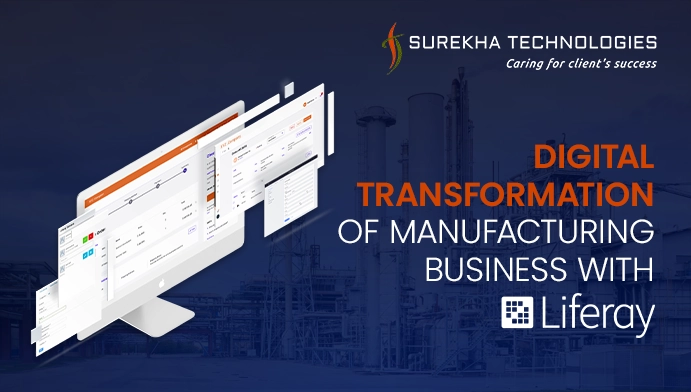The manufacturing sector has witnessed a substantial increase in the complexity of operations and the adoption of advanced technologies, with disruptions like Industry 4.0. For most manufacturing agencies, Digital Transformation is not only the priority now; but a necessity to thrive in this highly competitive era of business.
Traditionally, the primary focus of manufacturers was on production efficiency and B2B transactions to ensure timely order fulfillment for their customers. However, for modern manufacturing success, businesses need to broaden their focus to incorporate personalized customer experiences, individualized partner engagement, enhanced supplier relations, tailored business solutions, and empowered employees.
To address their unique business challenges and gain a competitive advantage, many manufacturing agencies are implementing Digital Experience Platforms (DXP). Moreover, there is a significant increase in the adoption of Liferay as an enterprise portal solution, primarily due to its diverse set of features and functions, such as open-source availability, user-friendliness, support for personalization, workflow automation, self-service functionalities, mobile responsiveness, scalability, and integration capabilities.
Major Challenges of Manufacturing Businesses
Manufacturing companies encounter critical challenges due to the continuous advancement of technologies, disruptions caused by startups, and complexities of their business operations. Here are some of the major business challenges faced by manufacturing agencies.
69% believe in disruption by Industry 4.0
65% are at early stage of transformation
70% consider technology a challenge
72% struggle to offer personalized CX
1. Incompatible legacy systems with modern technology and operations
Incompatible legacy systems pose one of the major challenges for most manufacturing businesses. These systems are often outdated, inefficient, and difficult to integrate with modern technologies, leading to reduced productivity, increased operational costs, and poor customer experiences. Also, not to forget that manufacturing businesses have complex supply chains and operations, which are highly difficult to digitize.
According to a recent survey by IBM, 70% of manufacturing companies are still using outdated systems for their business operations. Moreover, a study by Gartner has found that over 60% of manufacturing agencies plan to modernize their business management systems by 2027.
2. Competitive disruption with industry 4.0 and accelerated adoption of Digital Transformation amidst startups
Industry 4.0 is disrupting the traditional manufacturing landscape with digital technologies like IoT, AI, and robotics, which is creating a significant challenge for established businesses. In fact, McKinsey & Company stated in a recent study that Industry 4.0 technologies were already transforming operations in manufacturing before the COVID-19 pandemic and 69% of manufacturing executives believe that Industry 4.0 is disrupting their industry.
Most manufacturing companies are struggling to implement digital transformation due to resistance to change, lack of skilled and experienced professionals, risk management, and excessive cost of business management software. According to a survey by PwC, about 65% of manufacturing companies are still at the early stage of their digital transformation journey. The survey also revealed that over 70% of executives in manufacturing businesses believe that technological advancement is the primary challenge for their enterprises.
3. Creating personalized digital customer experience
Manufacturing businesses often focus primarily on production efficiency and on-time delivery, and creating an exceptional customer experience has emerged as the complex challenge for most. Only a few manufacturing businesses believe they are providing a good digital customer experience.
The National Association of Manufacturers (NAM) in collaboration with other industry professionals revealed in a recent study that 72% of manufacturers struggle offer personalized digital customer experience across various touchpoints. Only a few of manufacturing companies actually succeed in fully implementing digital customer experience strategies and it portrays a major gap between the potential for customer-centric digital solutions and their practical integration within the industry. The manufacturing industry is the primary beneficiary of enterprise and business management software.
6 ways to achieve Digital Transformation for Manufacturers with Liferay DXP

To remain competitive in the ever-evolving digital landscape of the manufacturing industry, enterprises must allocate resources toward technology and efforts that facilitate the connectivity of employees, suppliers, dealers, and other business associates, ultimately enhancing their ability to serve end customers more effectively. The section below will highlight how businesses can successfully implement Liferay DXP solutions for manufacturing success in future.
1. Liferay Self-Service Portal
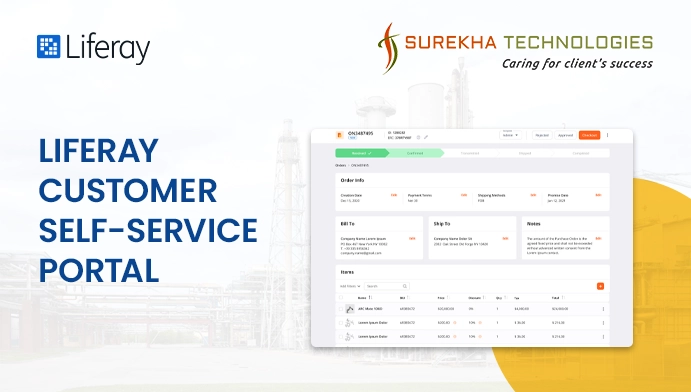
With Liferay, manufacturers can develop a customer portal that offers self-service functionalities, individualized digital experience, and personalized recommendations to the users, ultimately leading to improved decision-making in buying and customer retention ratio. The mentioned below are some of the features of the Liferay customer portal that differentiates it from other enterprise software.
Liferay customer portal features
- Self-Service functionalities
- Search capabilities
- Personalization
- Content recommendations
- Mobile-friendly
- User- friendly layouts and theme
- Insights, reporting, and analytics
- Flexibility
- Availability and scalability
Liferay customer portal key benefits
- Reduced cost-to-serve with self-service capabilities and personalized user experience.
- Unified user experiences and improved customer satisfaction.
- Easily convert your customer portal into a modern digital engagement portal.
- Secured customer data and portal access with customizable features.
Liferay customer portal use cases
The European civil defense and aerospace manufacturing company, Airbus Helicopters implemented a customer portal with Liferay DXP to improve the digital experience for almost 25,000 users all around the globe. Airbus claimed enhanced efficiency, reduced time to market, integrated enterprise solution, and improved user time on their portal.
2. Liferay B2B Commerce
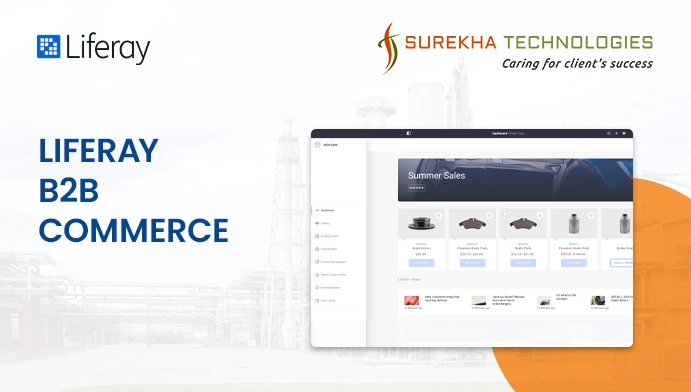
Liferay enables manufacturers to grow their business online with seamless B2B ecommerce experience. It boosts purchases by simplifying product presentation, comparison, digital product catalogue, and repurchase options. Manufacturers can also enable their customers to manage the size and frequency of their orders effortlessly.
Liferay B2B commerce features
- Improved shopping experience
- Self-service management of your account
- Sales and service support
- Smart Recommendations
- Order management
- Integrations and Connectors
Benefits of Liferay B2B commerce portal
- Improved customer experience through the Ecommerce platform.
- Enhanced sales and revenue.
- Streamlined ordering process.
- Efficient self-service and personalized recommendation.
- Real-time insights of orders and inventory.
- Reduced operation costs.
Liferay B2B commerce use cases
We helped a leading supplier of automotive technology and services to develop a Liferay B2B commerce portal. We successfully implemented Liferay portal to satisfy our client’s needs, which were a digital catalog that can serve more than 80000 SKUs via online portal based on different categories. The client improved website traffic and user engagement by 2X.
3. Collaboration Platform
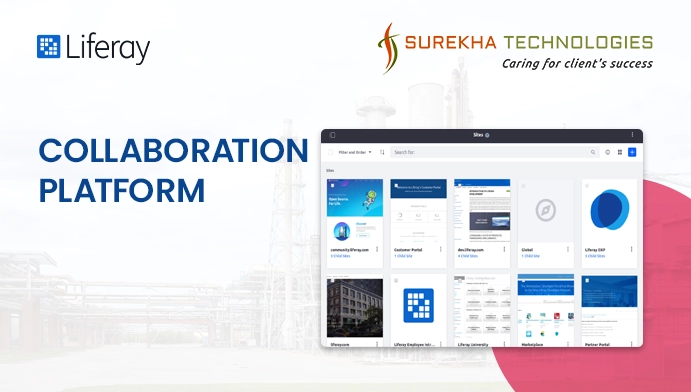
The Liferay collaboration portal is one of the transformative solutions for manufacturing companies looking for enhancing collaboration within and around their enterprises with user access management and roles-based permissions. The portal offers a centralized hub for employees, suppliers, partners, and dealers to communicate, share information, and collaborate effectively.
Liferay collaboration portal features
- Document sharing & management
- Project management
- Real-time messaging
- Role and permission management
- User access management
- Third-party integration
- Calander and event management
- Notifications and alerts
Benefits of Liferay collaboration portal
- Enhanced collaboration with document sharing and real-time messaging.
- Streamlined business operations with workflow automation.
- Optimized supply chains, improved product development, and ensured timely and cost-effective production with collaboration portal.
Liferay collaboration portal use cases
A leading German manufacturer of concrete pumps, Putzmeister, developed collaboration portal with Liferay to address the challenges of heterogeneous platforms, multiple logins, and time-consuming process of data management. The company improved user registration by 80% and reduced the efforts for data maintenance and backend administration.
4. Liferay Dealer Portal
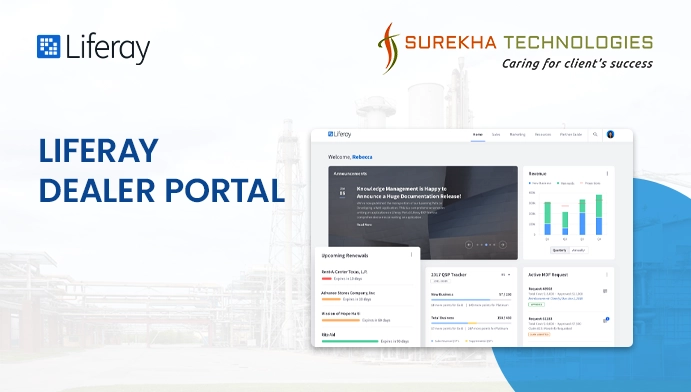
Liferay’s dealer portal empowers manufacturers to gain valuable customer data with bidirectional flow of information from and to their dealer and partners. The portal makes it effortless for the partners and dealers to work with an enterprise. It also automates the workflow from purchase to service.
Liferay dealer portal features
- Lead and opportunity management
- Service management
- Bidirectional flow of information
- Knowledge base
- Products catalogue
- Inventory visibility
- Collaboration tools
Liferay dealer portal benefits
- Real-time insights of available products and inventory.
- Effortless collaboration with dealers, partners, and suppliers.
- Reduced costs of maintaining distinguished portals.
- Improved customer service, and enhanced sales and revenue.
- Simplified buying workflows and pricing rules.
Liferay dealer portal use case
Volkswagen Group France was struggling with the challenges of multiple sites to support large volume of users. Liferay dealer portal implementation reduced the fragmented use of multiple applications along with enabling users to access essential documents and improving customer service.
5. Liferay DXP Websites
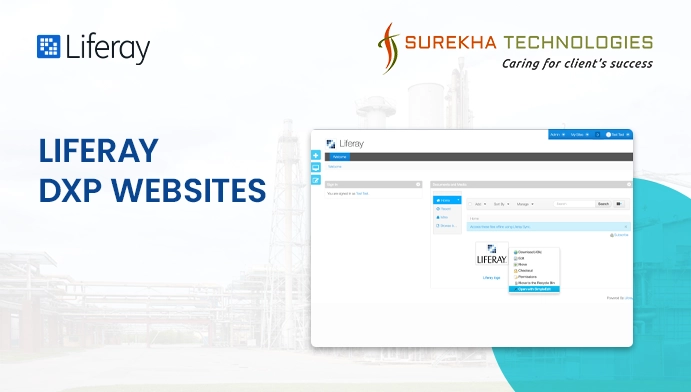
With Liferay portal, manufacturing companies can offer a seamless customer journey throughout the website from buying to post-sales support. Manufacturers can also create a competitive online presence and generate new leads with in-built Liferay portal features such as personalized, recommendations, multilingual support, user-friendly experience, and headless CMS.
Liferay external website features
- Content management
- Responsive designs
- SEO-friendly and content targeting features
- Multilingual support
- Personalized recommendations
- Rich media integration
- Advanced search functionalities
- News & updates
- Subscription
- Blogs and case studies
- Tags and categories
Liferay website benefits
- New leads and sales opportunities.
- Improved customer retention with subscription and forms.
- Reduced decision-making time in purchases.
- Easiness in gaining customer data and insights.
Liferay website use case
Bosch successfully implemented the Liferay website to address the challenges of generic and poor customer experience on their website. The company created a highly user-friendly website achieving a 4.2-star rating on Trusted Shops. They also integrated their back-end system with the website.
6. Integrated Platform
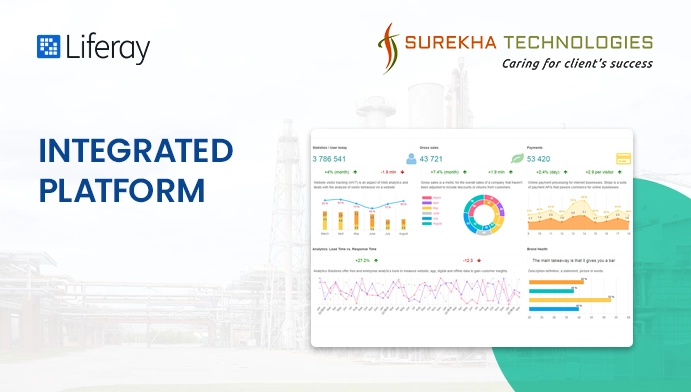
With Liferay’s robust integration capabilities, manufacturing businesses effortlessly deliver seamless and engaging user experience to drive sales growth by integrating ERP, CRM, and other business essential platforms. Manufacturing enterprises can serve multiple audiences with a single platform.
Liferay integration platform features
- Seamless integration
- API management
- Data synchronization
- Legacy system support
- Workflow automation
- Cloud integration
- Reports and analytics
- Multiple integration capabilities
Liferay integration platform benefits
- Integrate your legacy systems at ease.
- Improved manufacturing efficiency and overall productivity.
- Real-time monitoring and detailed insights.
- Serve multiple audiences with a single platform.
- Overcome fragmented processes, systems and data.
Liferay integration platform use case
The USA-based well-known software company, QAD Inc., implemented an integrated Liferay platform to connect their multiple websites. The integration resulted in a single solution for multiple websites, upgraded platform, quicker development, updated website, and improved performance.
Conclusion
Manufacturing businesses are currently facing critical challenges due to technological advancements and industry disruptions, including those brought about by Industry 4.0. It has become more crucial than ever for enterprises to implement digital transformation strategies for manufacturing success. Leveraging innovative digital transformation technologies such as Liferay DXP can empower businesses to automate workflows, streamline operations, improve productivity, drive growth, and gain competitive advantage. If you are planning to implement a Liferay portal for your business, book a call with our Liferay experts and get one step closer to successful digital transformation.
